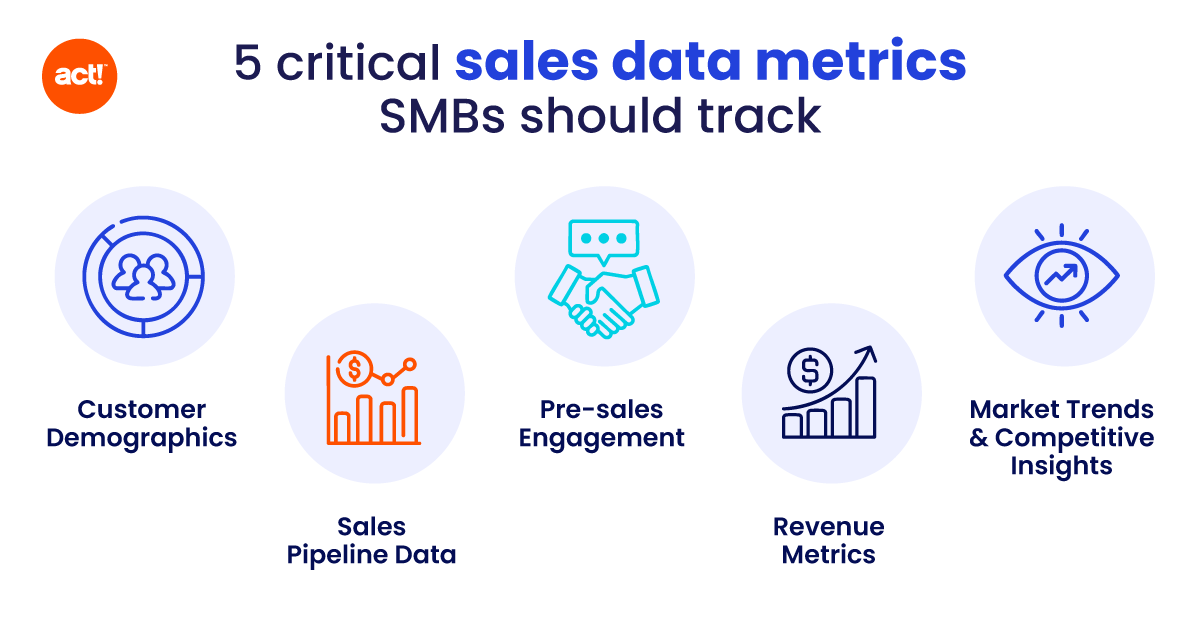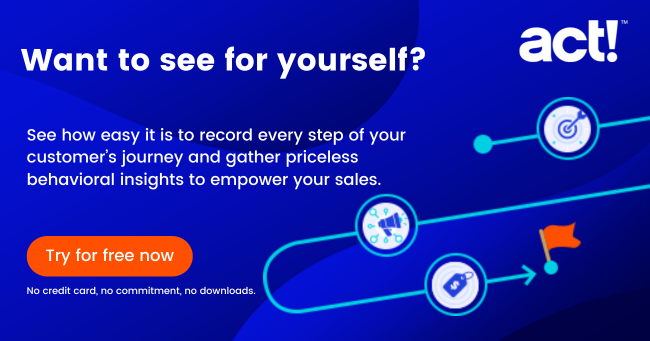
Did you know sales strategies based on behavior insights and real-time performance data achieve a 20 percent higher sales productivity?
By going beyond basic customer data, the top sales teams create systems that capture every interaction, analyze customer behavior, and predict which leads are most likely to convert, making every sales dollar count.
Imagine if your sales team could do the same.
In this article, we’ll show you the power of data-driven sales strategies and how they can give your small business a competitive edge. We’ll also share the key data points to track and the essential tools to help you collect and use this data effectively.
Why a data-driven approach matters for your small business
Data empowers your sales teams and helps them punch above their weight.
A prime example is Casper, the mattress startup that disrupted its industry by leveraging a data-driven sales approach in its sales and marketing campaigns. By analyzing customer insights and behavioral data, Casper created personalized content for every stage of its marketing strategies and sales funnels.
This approach not only increased customer engagement but also skyrocketed sales, turning the startup into one of the top mattress brands in just a few years.
If you want that level of success, here are four solid reasons why data should be at the forefront of your sales decision-making processes.
Sales budget optimization
As a small business, your budget isn’t built for costly experiments or broad, untargeted campaigns. Every dollar you spend needs to bring results. Data-driven sales strategies let you focus your resources on prospects with the highest chance of converting. This precision helps you maximize your ROI while keeping your sales efforts lean and efficient.
Higher conversion rates
Using data to drive leads ensures your sales team prioritizes quality over quantity. Instead of chasing every lead, your team can focus on prospects who align perfectly with your product or service. With a clear understanding of who is most likely to buy, you avoid wasting time and energy on uninterested leads, which means higher conversion rates and better use of your resources.
Tailored experiences
Understanding your prospects’ needs, pain points, and expectations is the foundation for building long-term customer relationships. Data helps you craft personalized customer experiences. When you know what your potential customers want, you can tailor your offer to their needs, leading to higher conversion, retention, and increased customer lifetime value (CLV).
Leveling the competition
In a crowded marketplace, small businesses face intense competition from larger enterprises with deeper pockets. Data levels the playing field. It enables you to make informed decisions, optimize your strategies, and achieve measurable results. With data on your side, you can compete effectively, even against companies with far more resources.
Critical sales data metrics SMBs should track

Now that you understand the importance of data-driven strategies, let’s discuss the specific data metrics you should track to optimize your small business sales performance.
1. Customer demographics
Understanding your ideal customer’s age, location, profession, and preferences allows you to segment your audience effectively, creating hyper-targeted campaigns that resonate. For example, if most of your high-value leads come from a specific industry or region, tailoring your outreach ensures your sales team focuses on leads with the highest potential, improving lead qualification and response rates.
2. Sales pipeline data
Tracking conversion rates, deal stages, and win-loss ratios gives you a clear picture of where prospects are dropping off. If many leads stall at the proposal stage, it could indicate pricing objections or a lack of perceived value.
By addressing these bottlenecks, you can optimize your pipeline, identify weak points in the funnel, and improve deal closure rates.
3. Pre-sales engagement and behavior
Metrics like email open rates, website visits, content downloads, and demo sign-ups reveal how prospects interact with your outreach and signal their buying intent. These insights enable smarter lead scoring, better follow-up timing, and highly personalized outreach, which ultimately increases conversions by focusing on the right leads at the right time.
4. Revenue metrics
Metrics such as average deal size, revenue by lead source, and potential revenue per customer segment help set realistic sales targets and highlight high-ROI activities. For example, if leads from a specific platform or marketing source consistently generate higher deal sizes, you’ll know where to allocate resources more effectively, aligning your sales goals with revenue potential.
5. Market trends and competitive insights
Tracking industry benchmarks and competitor performance ensures your sales strategies stay relevant and competitive. By understanding what’s working for others in your market, you can adapt to customer expectations, boost your positioning, and avoid falling behind industry trends.
The best tools for collecting crucial sales data
According to LinkedIn, 45 percent of sales professionals say incomplete data is one of their biggest challenges.
To succeed with data-driven sales processes, you need tools to accurately gather, organize, and analyze information from scattered sources. The right tools not only help with data analysis and collection but also empower you to turn raw numbers into actionable insights that drive revenue growth.
Here are some of the best tools for gathering data to create an informed small business sales strategy.
Act! for customer relationship management (CRM)
A robust CRM tool like Act! is the backbone of data-driven marketing and sales for SMBs. Studies show that 97 percent of sales professionals consider an integrated CRM system vital to their success.
Act! is an all-in-one marketing automation and CRM platform that centralizes customer interactions, notes, purchase history, and deal stages, providing a clear picture of your pipeline. You can use it to track every customer touchpoint with a lead, prioritize high-value prospects, and set reminders for timely follow-ups.
For example, if a prospect opens your sales proposal but doesn’t respond, the CRM can flag them for a strategic follow-up email or call.
Beyond tracking interactions, Act! empowers small business owners with built-in tools for landing pages and email automation to manage lead generation and nurturing processes.
You can trace a lead’s journey from the moment they land on your page to the point of conversion. Whether you’re running a targeted email campaign or capturing inquiries from a landing page, Act! ensures you never lose sight of your prospects and customers.

Google Analytics for audience insights
Google Analytics is an excellent data analytics tool for understanding customer behavior on your website. It tracks metrics such as page views, bounce rates, and time on site, helping you identify where prospects drop off in their journey.
By analyzing these patterns, you can optimize landing pages and call-to-action buttons, ensuring visitors take the desired actions, such as signing up for a demo or downloading a whitepaper.
Google and Meta Ad Managers for advertising insights
Google Ads Manager and Meta Ads Manager are powerful tools that give SMBs valuable insights into their advertising performance.
Both platforms help you analyze metrics like clicks, impressions, and audience engagement, allowing you to understand which campaigns deliver the best ROI. They enable precise audience targeting based on factors like demographics, location, and interests, ensuring your ads reach the right people at the right time.
With real-time performance tracking, you can refine your strategies on the go and reallocate budgets to high-performing campaigns. These tools ensure every advertising dollar is maximized, helping SMBs drive meaningful results without overspending.
Hootsuite for social media insights
Social media platforms like Facebook, Instagram, and LinkedIn provide native analytics to track likes, shares, comments, and ad performance. However, for consolidated and advanced analytics, Hootsuite is an excellent choice. Its insights reveal which types of posts resonate most with your target audience and where your leads are most active. Use this data to create content that aligns with audience interests, driving engagement and lead generation.
Are you ready to create data-driven SMB strategies?
Running sales campaigns without accurate data insights is like shooting arrows in the dark. By using Act! Along with the other tools we’ve shared, you can record every step of your customer’s journey and gather priceless behavioral insights to empower your sales teams.
Start your Act! free trial now to test its data-driven power for your small business.






